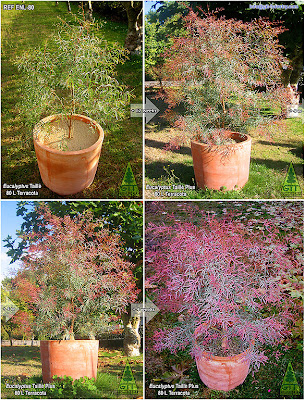We have seen previously in this EUCALYPTOLOGICS Blog how Eucalyptus can adapt well to different types of cultivation, variable depending on the final desired use (ornamental or timber production could be some of them), available space (big gardens, small gardens, or no gardens), choice of species (giants or not so giants) and details of "eucaliptocultura" applied.
One of the choices we have seen is the "giant bonsai sculpting" way, using big containers as growing medium and frequent maintenance operations of pruning to control growth and create a shape.
Today we see a combination of variation of shape and colour for some of these tamed giants, the first achieved via secateurs, and the second achieved by the normal seasonal variation of leaf colour present in some cold hardy Eucalyptus species when grown at mid latitudes.
FROM GREEN TO LAVENDER One of the choices we have seen is the "giant bonsai sculpting" way, using big containers as growing medium and frequent maintenance operations of pruning to control growth and create a shape.
Today we see a combination of variation of shape and colour for some of these tamed giants, the first achieved via secateurs, and the second achieved by the normal seasonal variation of leaf colour present in some cold hardy Eucalyptus species when grown at mid latitudes.
 (click image to enlarge)
(click image to enlarge)Frost tolerance: -12ºC to -15ºC
More information?
FROM BLUE TO SILVER
The reasons for these colour changes are physiologic responses to seasonal variation of key environmental factors affecting Eucalyptus growth and winter hardening. Two examples are pictured here, one dependant on decreasing photoperiods which affect leaf pigmentation (from greenish chlorophyll rich to reddish carotenoid rich photosynthetic pigments), and one dependant on decreasing daily minimum temperature which affects epicuticular wax accumulation (from a mildly waxy blue powdered coating to a thicker wax coating giving more silvery tones).
Being non deciduous trees, a first ornamental factor makes some cold hardy Eucalyptus species attractive as desing elements for gardens in temperate areas: their crown remains fully leaved by autumn and winter. But, in some cases, an extra factor enhancing ornamentality does appear: new colours appear and make the patterns of autumn last to next spring.
So, as you well see, Eucalyptus are not appropriate as ornamental plants, they cannot be grown in big containers, they cannot be grown in areas with frequent frost events, their growth cannot be controlled, and they are boring monotonous plants with little to offer to garden design.
That is why koala does not want you either.
Being non deciduous trees, a first ornamental factor makes some cold hardy Eucalyptus species attractive as desing elements for gardens in temperate areas: their crown remains fully leaved by autumn and winter. But, in some cases, an extra factor enhancing ornamentality does appear: new colours appear and make the patterns of autumn last to next spring.
So, as you well see, Eucalyptus are not appropriate as ornamental plants, they cannot be grown in big containers, they cannot be grown in areas with frequent frost events, their growth cannot be controlled, and they are boring monotonous plants with little to offer to garden design.
That is why koala does not want you either.



No comments:
Post a Comment